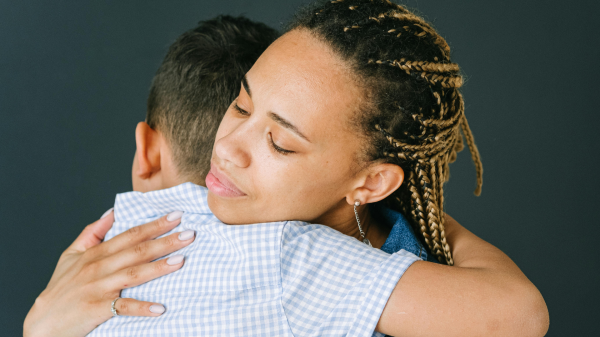Explaining an adoption plan to your other children can bring up hard questions and big feelings for everyone involved. Learn why these conversations matter and how to approach them with care.
Considering an adoption plan while you are already parenting brings a unique set of questions, including how and when to talk with your other children about your adoption plan. This can feel isolating at times, but you are not alone. More than 65% of expectant parents who work with The Cradle are already parenting other children. Many families have walked this road before, and The Cradle is here to offer guidance on having these conversations thoughtfully and with care.
Why is it important to tell my children about an adoption plan?
Children notice more than we often realize, and not knowing what happened to a sibling can be confusing or even frightening. They might wonder, “Was the baby bad? Did the baby do something wrong? Could this happen to me?” Helping your child understand that this adoption plan was not their fault or their sibling’s can help provide them with a sense of love and permanency in your family.
Talking with your children directly allows them to get answers from you, rather than wondering or hearing the story from less reliable sources. This conversation also gives you the chance to explain that your decision was made out of love for your baby and a desire for them to have the best life possible, explaining to your child how your circumstances now are different from when they were born.
It’s also okay if you are not ready to have this conversation right away. Depending on your circumstances, you may need to keep the adoption plan private for a time, and it is normal to worry about what your children might share before you are ready. You can wait until you feel prepared to talk with them, knowing there are opportunities to have these conversations when the timing is right. Many families find it helpful to involve their children in a session with an options counselor, where questions can be answered in a safe, supportive environment.
Helping Your Child Grieve When a Sibling Is Placed for Adoption
As you navigate your own emotions through this process, your other children may also be experiencing grief over not having their sibling in the home. It’s important to support them as they process these feelings without dismissing or minimizing what they are experiencing. Talking openly about the adoption gives children space to grieve and helps normalize their emotions.
Sharing your own feelings in an age-appropriate way can show your children that it is okay to have sadness, ask questions and express emotions. You might even invite them to sit with you so you can cry or reflect together, modeling healthy ways to cope with loss. Creating an environment where your children feel comfortable asking questions allows them to explore their feelings safely and receive reassurance directly from you.
There are also practical ways to help your children process sadness. Journaling or writing a letter to their sibling can provide a safe outlet for emotions. Participating in rituals such as an entrustment ceremony or dedication can provide a sense of closure and support their grieving process while reinforcing that your love and care for them remains constant.

How to Talk with Your Children About an Adoption Plan
Helping your children understand an adoption plan can feel challenging, but there are many ways to approach the conversation with love and care.
- Use age-appropriate language: Explain the adoption plan in ways your child can understand, emphasizing that you love their sibling and that this decision is made out of care and a desire for the best life for everyone involved. See our below for guidance specific to your child’s age group.
Having Difficult Conversations with Young Children (Ages 2-5)
Young children often take their emotional cues from the adults around them. At this stage, kids may struggle to understand their emotions abstractly and can easily misunderstand the information you share with them.
Using stories is a powerful way to help young children understand and express their feelings. Children naturally think in story form, so reading books about characters who feel sad, scared or confused can give them the language and tools to identify and process similar emotions in themselves. Play can also be an effective way to explore emotions. Acting out scenarios with dolls and toys allows characters to express feelings that your child might not be ready to express.
Additionally, physical mementos tied to the people, places or events you’re discussing can provide comfort and connection. These tangible items can serve as an anchor for positive memories, a source of reassurance and a gentle way to initiate important conversations.
Having Difficult Conversations with School-Aged Children (Ages 6-12)
School-aged children are just beginning to develop the ability to think abstractly. To help them express themselves, consider creative approaches like encouraging them to draw pictures or write letters about their emotions. These activities provide a safe outlet for processing their thoughts.
It’s also essential to reassure your child that conversations about tough subjects can happen at their pace. One effective method is “dropping pebbles,” which involves casually introducing an idea or question and then giving them space to decide if they’d like to address it. For example, open-ended questions like, “Do you want to tell me more about that?” show that you’re ready to listen without putting pressure on them to respond immediately.
Additionally, physical mementos tied to the people, places or events you’re discussing can provide comfort and connection. These tangible items can serve as an anchor for positive memories, a source of reassurance and a gentle way to initiate important conversations.
Having Difficult Conversations with Teens (Ages 13-19)
The teenage years are a time of exploration and identity formation. As they work to figure out who they are and gain independence, teens may naturally seek some separation from their parents. This can make it more challenging to approach sensitive conversations.
It’s important for parents to understand that teens may not always be eager to share their feelings. However, parents can create opportunities to talk by fostering a safe and trusting environment. Demonstrating that you can be a dependable confidant for your teen’s emotions is key to opening these lines of communication.
One effective way to build this trust is by engaging in shared activities that align with your teen’s interests. Whether it’s learning their favorite video game, playing a sport together or exploring the music they love, shared experiences create a foundation of connection and ease. Since many parent-teen conversations revolve around rules, limits and schedules, shared activities provide a space to have more open and varied conversations. Although they may pull away and seem opposed to your input, most teens are nevertheless listening and processing parental attitudes from a distance.
Physical mementos can also play a meaningful role when conversations involve loss or transition. A tangible reminder of people, places or events can provide comfort and serve as a catalyst for reflection and dialogue.
- Involve them when possible: Encourage your children to participate in choosing the adoptive family if appropriate and consider allowing them to meet the family when it feels safe and suitable.
- Read books about adoption together: Books such as Sam’s Sister by Juliet Bond can help open discussion and normalize the adoption experience.
- Arrange visits with their sibling: When it is safe and appropriate, maintaining a connection through visits or an open relationship with the adoptive family can help your child feel close to their sibling
- Connect with adoption-focused communities: Attending events or meeting other children who have been adopted can help your child understand that adoption is common and normalize their feelings.
- Seek professional support: Adoption-competent professionals can provide ongoing guidance for navigating questions, emotions and conversations.
Find Support
You don’t have to navigate these conversations alone. A counselor can guide you before, during and after your adoption plan, helping you talk with your children and support their emotions with care.
At The Cradle, options counseling services for expectant parents are free. If you are pregnant and need help figuring out your options, visit our Pregnancy Support page or call our 24-hour toll-free number to speak to a Cradle counselor: 800-272-3534.














